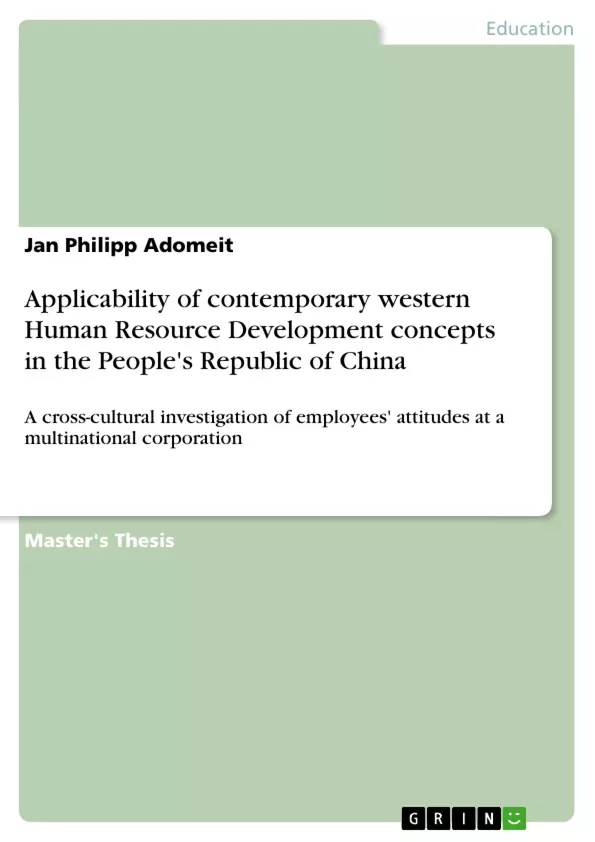The research literature and reports from human resource development practitioners often paint a picture of a Chinese culture of learning that is strongly guided by Confucian philosophy and has led to the firm establishment of an intensely lecture-focused educational environment in which the students are conditioned to be diligent, yet predominantly passive recipients of unquestionable wisdom and masters in the art of rote-learning. Contemporary human resource development concepts are quite contrarily based on a paradigm shift away from this traditional instructor-led approach to the creation of more learner-centred interventions which require the participants to be decisively more pro-active and critical in order to stimulate innovation and foster adaptability.
The purpose of the research conducted for this dissertation was firstly to investigate the validity of these two claims by an analysis of the relevant literature and then attempt to answer the question whether a possibly resulting conflict can be identified in the attitudes and expectations of Chinese employees working at a multinational corporation in Northeast China. in order to make a tentative judgment on the general applicability of western HRD interventions, using the unit of analysis as an example.
A cross-cultural survey was conducted to compare the characteristic values of Chinese employees in China with those of their non-Chinese counterparts working in Germany. The statistical analysis showed that although Chinese are significantly more open towards contemporary western HRD concepts than they might be expected to be, they clearly feature a preference for instructor-led training and a high degree of cultural conservatism –including a reluctance to criticise peers and trainerswhich might constitute serious obstacles on the path to a successful application of learner-centred methodology. This conclusion was furthermore verified by a qualitative interview conducted with the human resource manager at the unit of analysis.
Based on these findings, suggestions to modify concepts and to sensitise trainers and trainees to the cultural implications of creating a novel educational environment are given, so that the benefits of learner-centred interventions can be combined with the preferences and strengths of Chinese learners.
Inhaltsverzeichnis (Table of Contents)
- INTRODUCTION
- Context and Purpose of the Research
- Structure of the Paper
- REVIEW OF THE LITERATURE
- The Strategic Human Resource Development Proposition
- The Shift from Training to Learning
- Coaching
- Action Learning
- The Chinese Culture of Learning
- Conclusions from the Literature Review
- RESEARCH DESIGN AND METHODOLOGY
- Refratechnik - The Unit of Analysis
- Research Approach and Strategy
- Data Analysis, Sampling and other Quality Aspects
- The Primary Data Gathering Instrument
- Ethical Considerations
- PRESENTATION AND DISCUSSION OF FINDINGS
- Response Rate and Profile of Survey Participants
- Cultural Conservatism in Training Situations
- Attitudes towards Contemporary Western HRD Concepts
- Expected Trainer / Trainee Role Allocation
- Self-Assessed Learning Style Disposition
- Self-Assessed Training Needs
- Final Discussion and Recommendations
- CONCLUSION
Zielsetzung und Themenschwerpunkte (Objectives and Key Themes)
This dissertation investigates the applicability of contemporary western human resource development (HRD) concepts in China, specifically focusing on the attitudes and expectations of Chinese employees working at a multinational corporation. The research aims to assess whether there is a conflict between traditional Chinese learning practices, often rooted in Confucianism, and the more learner-centered approach prevalent in western HRD. The research explores the potential challenges and opportunities for implementing these concepts in a Chinese context.
- Cultural influence on learning and training in China.
- Comparison of Western HRD concepts and traditional Chinese learning practices.
- Attitudes and expectations of Chinese employees towards contemporary HRD approaches.
- Potential for conflict and compatibility between western and Chinese training methods.
- Recommendations for implementing learner-centered HRD interventions in a Chinese environment.
Zusammenfassung der Kapitel (Chapter Summaries)
The introduction provides context and purpose of the research, highlighting the rapid economic growth in China and the challenges of integrating western management concepts. Chapter 3 reviews relevant literature on strategic HRD, the shift from traditional training to learning, and the cultural influence of Confucianism on Chinese learning practices. The research design and methodology are described in Chapter 4, outlining the chosen unit of analysis, research approach, data gathering instruments, and ethical considerations. Chapter 5 presents and discusses the findings, examining cultural conservatism in training situations, attitudes towards contemporary HRD concepts, expected trainer-trainee roles, and self-assessed learning styles and needs. The chapter concludes with a discussion and recommendations for successful HRD implementation in China.
Schlüsselwörter (Keywords)
This research focuses on the key concepts of human resource development (HRD), cross-cultural management, Confucianism, learner-centered training, and the applicability of western HRD concepts in a Chinese context. The study examines the attitudes and expectations of Chinese employees towards contemporary HRD interventions and explores the potential for conflict and compatibility between traditional Chinese learning practices and modern HRD approaches.
Frequently Asked Questions
How does Confucianism influence learning in China?
Confucian philosophy traditionally promotes a lecture-focused environment where students are passive recipients of wisdom and masters of rote-learning.
What are the challenges of Western HRD concepts in China?
Western concepts often require pro-active and critical participation, which can conflict with the Chinese preference for instructor-led training and cultural conservatism.
Are Chinese employees open to modern Western training methods?
Research shows they are more open than expected, but they still feature a strong preference for clear role allocation and a reluctance to criticize peers or trainers.
What is the shift from 'training' to 'learning'?
It describes a paradigm shift away from instructor-led teaching towards learner-centered interventions like coaching and action learning to foster innovation.
How can trainers adapt to the Chinese cultural context?
Trainers should be sensitized to cultural implications and modify concepts to combine learner-centered benefits with the strengths and preferences of Chinese learners.
- Quote paper
- Jan Philipp Adomeit (Author), 2010, Applicability of contemporary western Human Resource Development concepts in the People's Republic of China, Munich, GRIN Verlag, https://www.grin.com/document/269377



